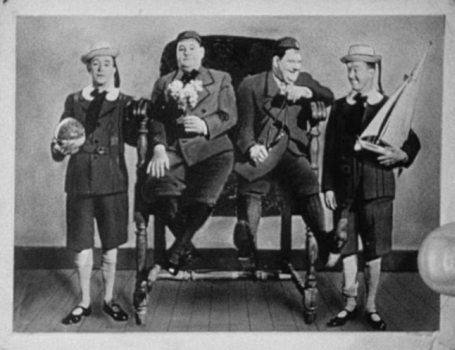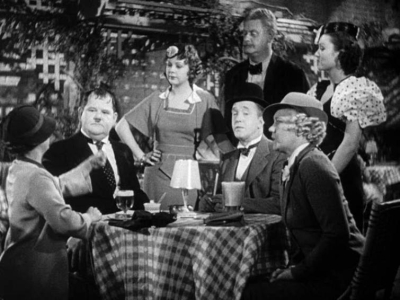OUR RELATIONS(1936)Written February-March, 1936. Filmed March-May, 1936. A Stan Laurel Production for Hal Roach Studios. Directed by Harry Lachman. Cinematography by Rudolph Maté. 74 minutes. Cast: Stan Laurel, Oliver Hardy, James Finlayson, Daphne Pollard, Betty Healy, Alan Hale, Sidney Toler, Iris Adrian, Lona Andre. STORY: Stan and Ollie each have an identical twin brother, a fact they keep secret from their wives out of fear that the girls will divorce them if they knew what "lowlife" siblings their husbands had. The twins, Alf and Bert, are sailors who just happen to be in town on leave. Confusion reigns as each set of twins is continually mistaken for the other. The truth is eventually discovered, and the Laurels and Hardys enjoy a happy reunion. |

 JL:
OUR RELATIONS is Laurel & Hardy's best-made feature film.
This is not to say that it's their best or funniest film, but the best
directed, best photographed, most tightly scripted, and most satisfying
as a dramatic whole. The problem with this film is that the focus
is so much on the storyline, there's little time for any classic
L&H routines to develop. The virtues of this film are such,
however, that I now rank it among their best features -- it's certainly
their most underrated one anyway.
JL:
OUR RELATIONS is Laurel & Hardy's best-made feature film.
This is not to say that it's their best or funniest film, but the best
directed, best photographed, most tightly scripted, and most satisfying
as a dramatic whole. The problem with this film is that the focus
is so much on the storyline, there's little time for any classic
L&H routines to develop. The virtues of this film are such,
however, that I now rank it among their best features -- it's certainly
their most underrated one anyway.
I admit that many of the things for
which I admire this film are things that usually don't matter in the
world of Laurel & Hardy. Most Roach-era films were, at Stan's
directive, photographed with even lighting throughout. This
allowed for a shadow-less set on which the Boys and their fellow
players were free to roam off their marks occasionally, without the
need for re-setting the lights. The focus was on the comedy
rather than the filmmaking. But I figure that when you've got a
legendary cinematographer like Rudolph Maté on this film, some
attention should be given to what he accomplished. There is a
more elegant look to OUR RELATIONS than most any other L&H film,
not only because of the classy-looking sets, but also because of Maté's
unique lighting design. Part of the reasoning for Stan's desire
for even lighting throughout was so that the Boys' faces would be
rendered a blankly as possible, free from lines and shadows (the light
pancake makeup they wore was also for this purpose). Maté
achieves this same effect by focusing pin spotlights on their faces,
while lighting the rest of the set with more subtle effects than in
most L&H films. This gives the Boys' faces special focus and
allows for the film itself to have a highly professional sheen.
Although the script does not allow for
memorable routines at L&H's customary casual pace, it's
nevertheless a fine script that has been staged and paced well by
director Harry Lachman. It would appear, for better and for
worse, that this is one film in which the storyline took precedence
over embellishing the comedy. Several sources describe deleted
scenes from OUR RELATIONS that seem to have had the potential for being
memorable, drawn-out routines (most often described is a
filmed-but-jettisoned scene in which Stan/Alf tries to give Ollie/Bert
a shave while contending with a faulty light bulb). This suggests
that the film is a rare instance of sacrificing laughs for the sake of
a better film overall. We can be thankful that this approach was
an unusual one, but we can also be thankful that it worked in this
instance.
It is because of this approach that we tend to
remember this film as a whole, rather than as a series of memorable,
loosely-connected bits. Moments that stand out are individual
gags (affixing Fin's toupee with a layer of mustard is a personal
favorite), rather than scenes or routines within an episodic
structure. Few gags in OUR RELATIONS stand on their own;
virtually all of them further the storyline. The result is a film
with fewer "quotable" moments than most L&H films, but also one
that is consistently involving and entertaining. There's never a
dull moment, even though some may fault the film for not enough funny
ones.
It is also, of course, the film that presents
two versions of Laurel & Hardy, both of which expand on various
aspects of their established characters. Curiously, Stan and
Ollie come off as much less interesting than twin brothers Alf and
Bert, which may explain why Alf and Bert have more screen time.
Alf and Bert are extensions of the carefree, fun-loving versions of
Laurel & Hardy found in such films as Two Tars and Men O'
War. Unfettered by the guilt or conscience of married men Stan
and Ollie, Alf and Bert act strictly on impulse and whim -- perfect
characters for a comedy version of LORD OF THE FLIES (too bad they
didn't do ATOLL K in 1936). Stan and Ollie are more subdued than
usual, perhaps because, for once, they haven't been given shrewish,
unsympathetic wives to play off and generate some sparks. The
wives in OUR RELATIONS turn nasty only when they've been understandably
led to believe their husbands have been philandering. As a
result, Stan and Ollie are the kinder, gentler set of twins -- although
the full extension of the "nice" side of Laurel & Hardy makes us
glad for the presence of Alf and Bert, as the Boys are always funnier
with a bit of mischief in them.
I can understand those who feel that OUR
RELATIONS is a lesser L&H feature, in that it's a more entertaining
film than a funny one. But repeated viewings have convinced me
that the entertainment values are so high, and the film itself so
skillfully made, it deserves consideration among their best, even if it
rewrites the rules for what makes a great Laurel & Hardy film.
 JB:
OUR RELATIONS is one of the few non-operetta Laurel and Hardy films
based on an outside source rather than on a story conceived by Stan
Laurel and the usual gang of Roach writers. It has its
roots in the 1903 short story "The Money Box" by W.W. Jacobs, an author
of seafaring yarns who is best known for his deathless (literally!)
horror classic "The Monkey's Paw". The film shows earmarks of
trying to fit Laurel and Hardy into a cleverly plotted story not
written for them - there is no setpiece that would work outside the
story, and a definite underexploitation of the combined talents of the
team. Their previous films, BONNIE SCOTLAND and THE BOHEMIAN GIRL, were
filled with such self-contained scenes that fully showed off Laurel and
Hardy's knack for creating engaging nonsense, but the films themselves
were clunky and marred by too much plot carried by too many people who
weren't Laurel and Hardy. OUR RELATIONS can actually be seen as a
radical change in approach, one that resulted in an entertaining and
artistically cohesive film that holds up better today than many of
their other features. Like SONS OF THE DESERT, OUR RELATIONS
clearly showed that, given the right story, Laurel and Hardy could
carry a feature film all by themselves - or in this case, with a little
help from their "twin brothers". That their next film was WAY OUT
WEST, a movie completely dominated by Laurel and Hardy, is probably not
a coincidence.
JB:
OUR RELATIONS is one of the few non-operetta Laurel and Hardy films
based on an outside source rather than on a story conceived by Stan
Laurel and the usual gang of Roach writers. It has its
roots in the 1903 short story "The Money Box" by W.W. Jacobs, an author
of seafaring yarns who is best known for his deathless (literally!)
horror classic "The Monkey's Paw". The film shows earmarks of
trying to fit Laurel and Hardy into a cleverly plotted story not
written for them - there is no setpiece that would work outside the
story, and a definite underexploitation of the combined talents of the
team. Their previous films, BONNIE SCOTLAND and THE BOHEMIAN GIRL, were
filled with such self-contained scenes that fully showed off Laurel and
Hardy's knack for creating engaging nonsense, but the films themselves
were clunky and marred by too much plot carried by too many people who
weren't Laurel and Hardy. OUR RELATIONS can actually be seen as a
radical change in approach, one that resulted in an entertaining and
artistically cohesive film that holds up better today than many of
their other features. Like SONS OF THE DESERT, OUR RELATIONS
clearly showed that, given the right story, Laurel and Hardy could
carry a feature film all by themselves - or in this case, with a little
help from their "twin brothers". That their next film was WAY OUT
WEST, a movie completely dominated by Laurel and Hardy, is probably not
a coincidence.
Part of the film's superior look can be
attributed to director Harry Lachman. A post-impressionist
painter who became a set designer and then a director, Lachman longed
to work with The Boys, whom he considered superb actors.
Lachman wanted to create a realistic look for the film that would work
equally well for a comedy or a drama, but that would not detract from
Laurel and Hardy's performances. It was at Lachman's suggestion that
Roach brought Rudolph Maté on board.
Roach also commissioned LeRoy Shield, the
former in-house musical director, to write the music for the
film. With his usual enthusiasm, Shield composed a complete
continuous musical suite for the film, only to see it cut to ribbons in
post-production. Nevertheless, many of Shield's happy themes for
OUR RELATIONS found their way into dozens of other Roach films,
including some older shorts (such as Perfect Day) which were
rereleased in 1937.
All in all, OUR RELATIONS was the classiest
production Laurel and Hardy had been in since FRA DIAVOLO. It's a
fun film with great supporting performances, especially by Jimmy
Finlayson as Bert and Alf's shipmate, and Alan Hale, Sr. as the
proprietor of Denken's Beer Garden, where much of the film takes
place. Arthur Houseman also displays his usual chemistry with
Stan and Ollie.
Still, when you have two sets of Laurels and
Hardys, you should be able to do more with them then just have them
constantly missing each other by mere seconds. Neither pair does
much damage in the film, and part of me wishes that more footage had
been devoted to Stan and Ollie (and Bert and Alfie) doing the things
that come natural to them - such bumping into doors, knocking things
over and falling down. I enjoy this film immensely, but the only
parts that make me laugh out loud are when Stan and Ollie are allowed
to be themselves, which happens at the beginning of the film, before
the S.S. Periwinkle pulls into port and unleashes Bert Hardy and Alfie
Laurel on an unsuspecting world. I get more solid laughs out of
Stan and Ollie reading and discussing the letter informing them of
their ne'er-do-well twins than I do from anything else in this film.






